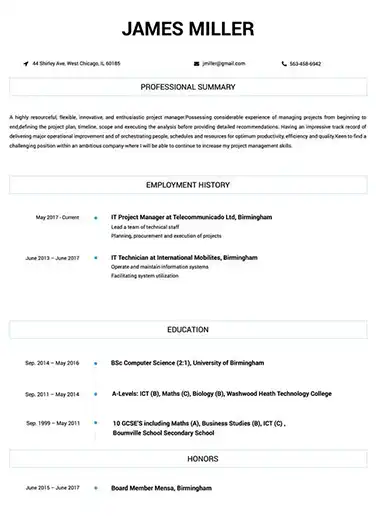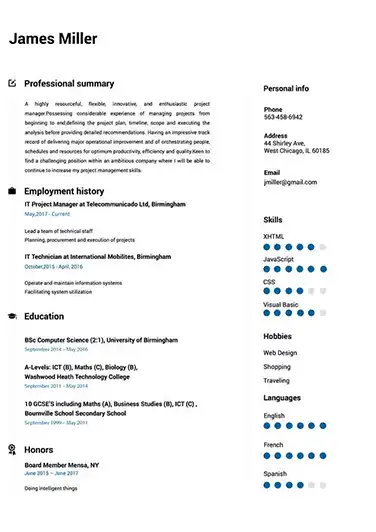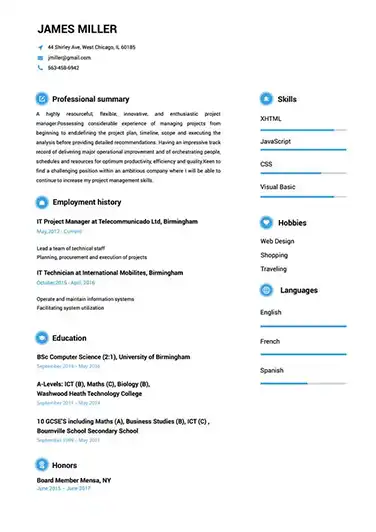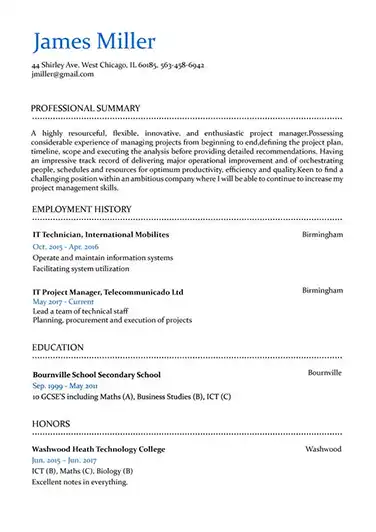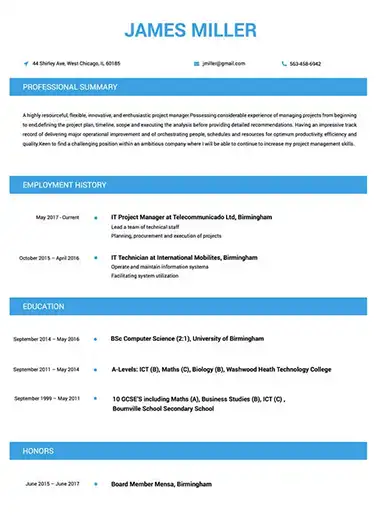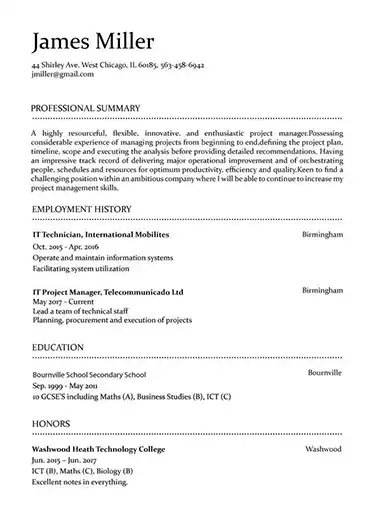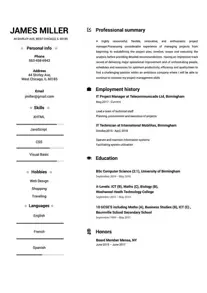 Use This Template
Use This Template
Build your resume in 15 minutes
Create an awesome resume that meets the expectations of potential employers with our selection of professional, field-tested resume templates.
chemical engineer: Resume Samples & Writing Guide
kingnate29@protonmail.com
729-746-9423
Professional Summary
Employment history
- Conduct experiments and interpret data to validate process design
- Design and develop new processes, products, and equipment
- Design and develop process control systems
- Manage projects from concept to completion
- Prepare process flow diagrams, process and instrument diagrams, and other documents related to process and equipment design
- Ensure compliance with applicable codes and regulations
- Manage projects from concept to completion
- Analyze process data and recommend process improvements
- Ensure compliance with applicable codes and regulations
Education
Skills
Do you already have a resume? Use our PDF converter and edit your resume.
harryedwards@yahoo.com
913-999-2817
Employment history
- Troubleshoot and optimize existing processes, equipment, and products
- Conduct experiments and interpret data to validate process design
- Perform process simulations and modeling
- Conduct experiments and interpret data to validate process design
- Design and develop new processes, products, and equipment
- Prepare process flow diagrams, process and instrument diagrams, and other documents related to process and equipment design
- Design and develop new processes, products, and equipment
- Perform process simulations and modeling
- Develop and implement process control systems
Education
Skills
yvettecarter@mail.com
695-333-9243
Professional Summary
Employment history
- Prepare technical reports, process descriptions, and other documents
- Perform process simulations and modeling
- Analyze process data and recommend process improvements
- Perform process simulations and modeling
- Prepare process flow diagrams, process and instrument diagrams, and other documents related to process and equipment design
- Collaborate with other engineers and departments
- Monitor and analyze process performance and recommend process improvements
- Develop and implement process control systems
- Manage projects from concept to completion
Education
Skills
griffin.kenny@gmail.com
706-144-8838
Employment history
- Prepare technical reports, process descriptions, and other documents
- Collaborate with other engineers and departments
- Monitor and analyze process performance and recommend process improvements
- Monitor and analyze process performance and recommend process improvements
- Develop and implement process control systems
- Troubleshoot and optimize existing processes, equipment, and products
- Manage projects from concept to completion
- Ensure compliance with applicable codes and regulations
- Conduct experiments and interpret data to validate process design
Education
Skills
nelsonmike@yandex.com
612-415-0782
Employment history
- Ensure compliance with applicable codes and regulations
- Conduct experiments and interpret data to validate process design
- Develop and implement safety and environmental regulations and procedures
- Monitor and analyze process performance and recommend process improvements
- Prepare process flow diagrams, process and instrument diagrams, and other documents related to process and equipment design
- Design and develop new processes, products, and equipment
- Prepare process flow diagrams, process and instrument diagrams, and other documents related to process and equipment design
- Monitor and analyze process performance and recommend process improvements
- Design and develop new processes, products, and equipment
Education
Skills
Not in love with this template? Browse our full library of resume templates
Are you looking to move on up in the world of chemical engineering? Perhaps you’ve been waiting for years for your manager to finally recognize all of your good work. Or maybe you’re simply uninspired at your current job and spend your days waiting for the clock to tick down to home time.
Whatever your reasons for wanting more from your career, you’ll need a strong chemical engineer resume to get you there.
Needless to say, a well-composed resume is the ticket to a great job in any profession. But it’s a particularly important document for chemical engineers considering that job growth in the sector isn’t exactly booming. According to the Bureau of Labor Statistics (BLS), employment of chemical engineers is projected to grow 6 percent from 2018 to 2028. This certainly isn’t dismal, but it’s just one percentage point higher than the average for all occupations.
Don’t worry if your resume is currently looking a bit scrappy… or if the last time you updated it was basically when Robert S. Langer got his start as a chemical engineer. We’ve compiled all of our very top tips for making a winning resume in this handy 2020 chemical engineer resume writing guide.
If you’re wondering why you should spend time reading this guide, the short answer is that it will help you snag the chemical engineer job you’ve always dreamed of. After all, spending your life in a job that you don’t have your whole heart in is never a good idea! You deserve to feel fulfilled at work, especially given that it’s estimated we each spend an average of 90,000 hours at work over our lifetimes. That equates to one-third of our lives!
So what can you expect to read? Our guide features all of the useful information and expert pointers you need to craft an amazing resume including:
- The right resume format to use to fit your particular circumstances
- Which technical and interpersonal skills are worth emphasizing
- What an Applicant Tracking System (ATS) is and how to effectively beat it
- Expert tips for featuring your education as well as training and certifications
- An easier way to make an explosive chemical engineering resume
1. Multiple Template Examples
2. How Do You Write a Chemical Engineer Resume That Will Get You the Job?
How should you format your chemical engineer resume?
Let’s start off this resume writing guide by discussing one of the most underestimated features of any good resume: a strong format. The format you select is incredibly important because it will impact two major factors:
- The order in which a recruiter reads each section of your resume.
- The overall perception a recruiter has of your job application.
Considering how critical these factors are to the success of your job hunt, there’s no room for error when it comes to selecting a resume format.
Don’t worry, doing so is actually very straightforward once you know which one is most suitable for your situation. Below, we’ve shared a simple guide to determining the right one for you:
- If you’re an entry-level chemical engineer, select a functional resume format. This format positions your skills and abilities front and center to divert attention away from your inexperience.
- If you’re an experienced chemical engineer, select a reverse-chronological resume format. This format positions your work history front and center in your resume. It also orders each role from most to least recent. In effect, these two features help to draw attention to the fact that you’re a candidate with plenty of professional experience.
Before we share all of our insider secrets for writing a stunning chemical engineer resume, there’s one more matter we need to draw your attention to. Below, we’ve included the standard layout guidelines that we strongly recommend you follow when piecing together your resume.
To clarify, these guidelines don’t just represent our own preferences – they have been devised to reflect the general expectations HR personnel have when it comes to a resume’s layout. Follow them, and you’ll be giving recruiters precisely what they’re after.
- Number of Pages: 1 page at most.
- Fonts to Use: A font that not only recruiters can read without a problem, but also one that can be easily processed by the ATS. For example, Calibri or Arial.
- Fonts to Avoid: Any fonts that wouldn’t be appropriate to use when typing up a lab report, such as Ways to Say Goodbye and DJ Fiddlesticks.
- Margins: 1 inch on all sides.
- Line Spacing: 1 or 1.15.
- Header size: 14-16 point size.
- Text size: 11-12 point size.
What will recruiters look for?
When you get started on your chemical engineer resume, you’ll need the right elements in place. Essentially, you’re looking for a catalyst to spark the recruiter’s interest.
Recruiters will be looking for chemical engineer candidates that are knowledgeable in the field, bring a wealth of experience, have a professional outlook, and great communication skills. Within your resume, you’ll need to tick all of the above boxes.
Chemical engineers are responsible for developing processes using science to support various industries. Much of the time, this role falls into one of two categories; design, manufacturing, and operating of machinery, or the ongoing development of substances and materials. Make sure to choose your specialization before applying for roles.
Whichever type of chemical engineering role you’re going for, the HR team will be looking for a set of technical and interpersonal skills. For this reason, it’s integral to highlight your abilities in problem-solving, project management, or the use of advanced IT, among other skills.
Pro tip: Speak the recruiter’s language. They may not be familiar with chemical engineering. State what certain terms mean, when possible. For example, if you say you’re an expert in ‘filtration’, explain that you mean passing liquids through a filter.
How do you get your resume past ATS?
Twenty years ago, you’d write your resume, send it off, and it would land in the hands of the recruiter. It was a simpler time. However, as the technological world advances, so does the way companies recruit candidates. Chances are, when you send out your resume, it will need to get through an Applicant Tracking System (ATS) first.
If you’re aiming high, there’s something you should know: 98% of Fortune 500 Companies use ATS when recruiting. Understanding what an ATS is and how you can get your resume past it will give you the best chance of success. Let’s start with the basics.
An ATS is a type of software that manages incoming applications for a company. Before passing the resumes onto a human, such as a recruiter, the system scans each of them looking for specific keywords and criteria. Essentially, it makes a recruiter’s job easier by presenting them with the very top candidates for a given role.
There’s just one problem…These computer-based systems aren’t perfect. Since they search for specific keywords, some stellar applications slip through the cracks. It’s your job to stop that from happening with your own resume.
Fortunately enough, there’s a way to beat the software. First things first, look at the language used in the original job posting. Take a moment to note down the exact phrases and keywords it uses. Next, edit your existing resume to match this wording. That way, the text used in your chemical engineer resume will match the keywords that the ATS is searching for. In turn, this will help to ensure your application gets past the system.
What technical and interpersonal skills does a chemical engineer need to excel?
Next up, let’s talk about the skills a recruiter is looking for in a chemical engineer. Avoid overloading your “Skills” section. While you may have an endless list in your mind, stick to around 6 to 8 skills. Remember, always put quality before quantity.
When a recruiter takes their first glance at your resume, they’ll be looking for two types of skills: technical and interpersonal. Want to present yourself as the whole package? You’ll need to offer a mix of both skill sets. Show the recruiter that you’re more than just a scientific whiz kid. Highlight how you’re also the go-to person when it comes to dealing with people.
At this stage, you need to refer back to the job advertisement. It’s a treasure trove of skills-related information you need to make the right impression. To get an idea of the skills you should include, take a look at the skills listed in the posting. The closer you can get to that list, the better your chances of landing a job interview will be.
Need some inspiration? Here are some suggestions of the technical and interpersonal skills you may include in your chemical engineer resume in addition to the skills you identify in a given job ad:
Technical skills
- Technical design
- Complex problem solving
- Process testing
- Project management
- Operations analysis
- Quality control analysis
- Knowledge of physics
- Design skills
- Process safety management (PSM)
- IT skills
Interpersonal skills
- Time management
- Active listening
- Communication skills
- Dedication
- Trustworthiness
- Coordination
- Negotiation
- Approachability
- Teamwork skills
- Ability to prioritize tasks effectively
How do you list your education?
It’s no easy feat to become a chemical engineer. According to the BLS, you’ll need to typically study for 4 years to earn a bachelor’s degree in chemical engineering or a related field. You’ll not only need to engage in standard college coursework, but also laboratory and field studies.
If you’re a particularly high-achiever, you may even enroll in a 5-year engineering program to earn a master’s degree in addition to your bachelor’s degree.
So how do you ensure your educational achievements don’t simply blend in with the rest of your resume? Create a well-organized “Education” section. Recruiters prefer this section to be simple and easy to read, so make sure to feature only the most critical details about your educational background.
To be clear, you only need to include the following details in list form for each of your degrees or diplomas:
- Title of the degree or diploma
- Name of the educational institution you studied at
- The state the educational institution is located in
- The years you studied
You can refer to the following example in order to correctly fill out this section:
- Bachelor of Science in Chemical Engineering, Pennsylvania State University, PA, 2016 - 2020
Pro tip: If you graduated with a GPA of 3.5 or above, don’t be shy about making it known! You should most definitely feature this amazing achievement in this section. If you’re an entry-level chemical engineer, you can also mention it in your “Resume Objective” so that you can immediately capture a recruiter’s attention.
How to write a resume objective (including examples of it)
New to the chemical engineering game? If you can recall donning your graduation cap in the last year, you should make sure to write a “Resume Objective” section. You should also write one if you have a few years or less of professional experience in the industry.
Since you will only have limited experience (if any at all), your resume objective will serve as a snippet of your goals. It should primarily include information about your education, relevant skills, and any additional achievements you’ve gained that a recruiter would be interested to learn about.
You’ll find it helpful to note down some ideas before working on your resume. Rack your brains to find the nuggets of information that will attract a recruiter. Ask yourself the following questions to get off to a strong start:
- What is it that makes you special?
- What achievements have you gained that give you the edge?
- What are your main goals?
When you’ve done that, it’s time to put your fingertips to the keyboard and get writing. Here’s a quick tip: Ask not what the company can do for you, but what you can do for the company. Focusing on what you want out of your career may seem natural, but it’s a sure-fire way to turn a recruiter off. For example, here’s what you shouldn’t write:
- Recent Chemical Engineer BSc graduate seeking a fulfilling role in a large-scale manufacturing business. Currently looking to further build my process analysis and troubleshooting skills with the aim of climbing the professional ladder. What I lack in experience I make up for in determination to succeed.
The above resume objective is highly unlikely to pique a recruiter’s interest. For one thing, the entire statement is geared toward what the candidate can gain from this role. That’s mistake number one but, unfortunately, the sequence of errors doesn’t end there.
The second sentence suggests that the candidate would be fast to move jobs in hope of a speedy progression. That’s a major red flag for recruiters. It gives the impression that the candidate would use the role as a training opportunity before jumping ship. Last but not least, the final sentence says very little while coming across as a bit pretentious. Wrong, wrong, and wrong again!
Let’s scrap the above attempt and move on. If you want to engage the recruiter, tell them what you have to offer the company while setting out your skill set. For example, the following resume objective is simple yet extremely effective:
- Chemical Engineering BSc graduate with a deep interest in the pharmaceutical industry. Previous achievements include managing group projects during college, taking a lead on analysis, and sustaining a top 10% rank in classes. Seeking a role within a pharmaceutical company in which I can learn while supporting the team in developing streamlined systems and continually analyzing ongoing processes.
Can you spot the difference between the two examples? This resume objective tells the recruiter everything they need to know. The candidate is clear about their professional intent, which directly aligns with the company they’re applying to work for. As they don’t have any professional experience yet, they instead refer to their college experience and impressive achievements there.
Aside from that, the candidate directly states what role they hope to take within the team. They make it clear that they plan to learn on the job but also set out their goals that will benefit the overall business. All of the above makes them a far more attractive option for recruiters than the previous candidate.
Pro tip: If you find it hard to identify what makes you special as a candidate, don’t be afraid to get a second opinion! Ideally, you can talk to someone who knows you professionally. For instance, you could ask a former lecturer to give you some tips you can use as a starting point.
How to write a resume summary (including examples of it)
The “Resume Summary” section is suited to people with experience in the industry. On the other hand, if you’re fresh out of college, you’ll need to write a “Resume Objective” section instead.
Ready to create a chain reaction? When a recruiter takes a peek at your chemical engineer resume, their eyes will be particularly drawn to one section: Your resume summary. This section is your time to shine and show off your best attributes. Recruiters spend an average of five to seven seconds looking at each resume so keep things short, snappy, and engaging!
While you can ramble on about your skills, experience, and what you’ll bring to the role, sometimes less is more. Aim to write between 2 and 4 sentences for this section. Cover the highlights of your chemical engineer resume. Think of this like the blurb for an action-packed movie. What can the recruiter expect when they watch the whole thing?
Don’t make the biggest mistake here. Since the world of chemical engineering is varied, you have to be specific. Using vague and general terms will get you nowhere fast. For example, the following resume summary leaves way too much to the imagination:
- Chemical engineer with over three year’s experience working within a professional department. My team was responsible for designing and operating machinery to support the company processes. Experienced in process analysis, project management, troubleshooting, and problem-solving.
Put simply, the above resume summary could describe any chemical engineer candidate. This statement lacks any specifics or details. A recruiter would take one look at it and dump the resume in the ‘no’ pile. To add insult to injury, the language used in these lines is bland and shows no enthusiasm.
So, how can you craft a resume summary that packs a real punch? Sprinkle in some juicy details and let your experience talk for itself. Combine that with some powerful adjectives and you’ve got a recipe for success. Here’s an example that highlights how to do this:
- Highly-efficient chemical engineer with experience in the waste removal field. Previous professional achievements include designing and operating innovative machinery which streamlined company processes by 16%. Experience working with a close team of waste removal experts. Additional skills include technical troubleshooting, excellent communication, and project management.
The above resume summary is a show-stopper. Tailored to the company that the candidate is applying to, the statement details the candidate’s experience in that area. Aside from that, it quantifies their achievements using percentages. When a recruiter looks at this statement, they can quickly see how valuable the candidate is.
Pro tip: Saying you’re “highly-efficient” or “excellent” will catch the recruiter’s attention. Chemical engineer resumes will often use bland and direct language. Stand out from the crowd but make sure you can back-up any claims with facts.
How do you list any additional details, like certifications and training?
Got some extra achievements you want to shout about? Don’t worry, there’s room for them on your chemical engineer resume. Each one you feature should at least be related to chemical engineering. However, it’s most ideal if you have one or two that are directly relevant to the given job you’re applying for.
So where should you include your relevant additional training or certificates? Typically, you should include them within a “Training and Certificates” section in a bullet-point format.
For instance, if you completed an optional Project Management course in a previous role, you can list it in this section. However, make sure to avoid adding too much detail. The following information is adequate to include for each one:
- The title of the training course or certification
- The name of the institute that administered it
- The state you completed it in
- The year/s you completed it
That means your “Training and Certifications” section should definitely not end up looking like this:
TRAINING AND CERTIFICATIONS
- Completed a Project Management course from L.A. Institute between 2014 and 2015. The course consisted of three classes over two semesters and included training on how to lead a team project successfully.
The above description is full of fluff that the recruiter doesn’t need to read. Make their job simple by cutting to the chase and giving them only the essential details. With this in mind, we rewrote the previous training and certifications section. As you’ll see, it’s tenfold easier to read:
TRAINING AND CERTIFICATIONS
- Project Management Course, L.A. Institute, 2014 - 2015
How can you target your resume for each application?
You’re a busy person, but that doesn’t mean you can fire out the same resume to fifty different employers. Be sure to tailor your chemical engineer resume to suit the company for which you’re applying. Rather than using a one-size-fits-all technique, be specific in your targeting.
Before hitting ‘send’, tweak your resume to ensure it suits the requirements of the given company and role. Highlight the skills that the company is asking for within the job posting. As previously mentioned, you should also use the same type of language used in the respective job ad.
Take the time to research each company and understand their goals and values. If you can align your resume to suit their outlook, you’ll instantly boost your chances of success.
So grab your detective hat and monocle and get started.
While you don’t need to do a deep dive into the history of the company, be sure to look for the basics. What are the company’s aims? What’s its mission statement? What are its central processes?
All of the above will give you clues about what the company and recruiter are looking for in an ideal candidate. When you’ve done your research, you will have the information you need to ensure your resume conveys not only what attributes you offer, but also what you can do for the company in question.
Pro tip: Should you make it to the interview stage, you’ll need to delve deeper into the company when doing your research. Interviewers love nothing more than to test candidates’ knowledge of their company, so it’s vital to remember a few company-related facts to avoid being caught out. If you really want to impress, you may wish to go a step further. For example, you can look for holes in their current system and suggest any viable solutions you could offer.
How do you make your resume stand out?
At the time of writing, there are only around 1100 jobs on LinkedIn for chemical engineers in the United States. That’s not a whole lot of jobs to go around, is it? Especially when you consider that most will probably not even be located in your state. That means it’s crucial to go the extra mile to make sure your resume genuinely stands out. Here are our experts’ top tips for making this happen:
- List any relevant publications you have to your name: Not every chemical engineer will have relevant publications to their name. So if you do, including them on your resume is a surefire way to stand out! Keep in mind that you should only include publications that have a substantial connection to the job you’re applying for, or at the very least are relevant to chemical engineering in general.
If you have the space to do so, you can include key details about each one in a dedicated “Publications” section. Alternatively, you can mention one or two in your resume objective or summary. - Avoid fluff at all costs: As a chemical engineer, you’ll know full well of the importance of precision in your line of work. While their job couldn’t be more different, recruiters similarly value this quality, particularly when it comes to resumes.
They much prefer to take the time to read resumes that are clear, concise, and 100% fluff-free. So if you want your resume to stand out, remember to be precise in your wording and avoid adding any extra words for the sake of it! - Ensure your resume holds up however it’s viewed: One of the biggest errors a surprising number of candidates make is that they forget to check if their resume will retain its appearance when viewed in different programs or printed off. This is a simple but fatal mistake to make because it can lead to the downfall of even the most brilliantly-written resume.
Think about it. A recruiter isn’t going to waste their time trying to decipher a resume that became misaligned and/or unreadable simply because they opened it up in Google Docs rather than MS Word.
These types of issues often crop up when a candidate uses a non-standard font, images, or a poorly-made resume template to make their resume. Using them can also cause problems with the ATS, so it’s best to avoid doing so altogether. If you want to ensure you don’t encounter such problems, your safest bet is to opt for a trusted ATS- and HR-friendly resume format.
3. How to Make an Explosive Chemical Engineer Resume Using Resumebuild.com’s Resume Builder Tool
If you were to ask 100 job seekers to share what they dislike most about job hunting, the majority would be quick to say something about getting their resume in order. This task is crucial to take care of, given that it’s usually the only ‘in’ you have at a company.
But at the same time, it’s an unpleasant experience all round. Not only does making a resume from scratch take several days to complete, but it’s also very boring to do so! After all, whose idea of fun is it to write line after line about themselves?
And let’s not forget the fact that this isn’t a task that you can do one time and be over with. As we explored above, it’s vital to target your resume for each application. As such, no two resumes you submit should ever be the same. That means that even once you finish making your resume, you’ll need to spend hours continually customizing it to suit each and every job you apply to.
Truth be told, we think that job seekers simply don’t have the time nor energy (let alone the motivation!) to do all of this alone. It was this realization that encouraged us to rethink how job seekers create their resumes. Our revolutionary resume builder is the culmination of countless hours of research into how to make the resume creation process as easy, quick, and pleasant as possible.
Should you give it a go for yourself, you’ll see that you don’t need to dedicate days or even hours to make a job-winning resume. Believe it or not, you can even make your chemical engineer resume in only a couple minutes using it! Our builder’s streamlined design, as well as handy features like job-specific pre-written examples and ready-made resume templates, make this a reality.
So what are you waiting for? Get hired sooner rather than later by making your chemical engineer resume at ResumeBuild.com.
chemical engineer Job Descriptions; Explained
If you're applying for an chemical engineer position, it's important to tailor your resume to the specific job requirements in order to differentiate yourself from other candidates. Including accurate and relevant information that directly aligns with the job description can greatly increase your chances of securing an interview with potential employers.
When crafting your resume, be sure to use action verbs and a clear, concise format to highlight your relevant skills and experience. Remember, the job description is your first opportunity to make an impression on recruiters, so pay close attention to the details and make sure you're presenting yourself in the best possible light.
chemical engineer
- Worked as a chemical Engineer in PepsiCo for an year in Mumbai.
- Managed Vendors, their work and payment.
- Coordinate with other professionals
- Established compatibility with third party.
chemical engineer, technical office engineer
- Implementation and follow up of ISO procedures
- Study, define quantities, request quotations and prepare for the Tech. Manager the comparison sheets for materials to be incorporated in the Project, as per Specifications
- prepare paper and worksheet of any tenders & contracts for the company
- Organize and monitor all technical activities for various projects and ensure compliance to all objectives and prepare appropriate budgets and coordinate with various staff to ensure customer satisfaction.
- Monitor all equipment and tools and complete all projects within required time frame and ensure optimal quality standards for same and monitor efficient working of multiple projects.
chemical engineer
- Supervise el trabajo de los empleados de oficina, los servicios administrativos y de servicio al cliente para garantizar el cumplimiento de los estándares de calidad, los plazos y los procedimientos adecuados, corrigiendo errores o problemas. Inventario y pedido de materiales, suministros y servicios. Mantenga y mejore los sistemas de archivo, inventario, correo y base de datos, ya sea manualmente o usando una computadora. Llame a teléfonos, llame directamente y tome mensajes. Máquinas de oficina, fotocopiadoras y escáneres, máquinas de fax, sistemas de correo de voz y computadoras personales.
- Reúna, cuente y desembolse dinero, realice la contabilidad básica y complete las transacciones bancarias.
- Comuníquese con clientes, empleados y otras personas para
- Completar y enviar facturas, contratos, políticas, facturas o cheques por correo postal. Responda preguntas, disemine o muestre información, reciba pedidos de atención y atención quejas.
chemical engineer
- Troubleshoot problems of continuous Polyurethane foam plant production.
- Perform tests and monitor performance of processes throughout stages of production to determine degree of control over variables such as temperature, quality and density.
- Conduct research to develop new and improved Polyurethane foam manufacturing processes.
- Perform laboratory studies of steps in manufacture of new product and test proposed process in small scale operation.
chemical engineer
- Currently working in a continuous production activity of Pthalic Anhyadride. This process included different types of unit operations and unit processes like Distillation,Oxidation etc.
- Handled the DCS (YOKOGAVA).
- Having good exposure of handling the equipment’s like Distillation columns,Reactors,Scrubber,Steam turbine,Different types of pumps,Heat exchanger,Condensers etc.
- Chemicals handling like Ortho xylene,Pthalic Anhyadride,HCL,NaOH,NaNO2,Kno3,Na2CO3 etc.
- Documentations related to the Reports, Equipment efficiency data etc.
chemical engineer Job Skills
For an chemical engineer position, your job skills are a key factor in demonstrating your value to the company and showing recruiters that you're the ight fit for the role. It's important to be specific when highlighting your skills and ensure that they are directly aligned with the job requirements, as this can greatly improve your chances of being hired. By showcasing your relevant skills and experience, you can make a compelling case for why you're the best candidate for the job.
How to include technical skills in your resume:
Technical skills are a set of specialized abilities and knowledge required to perform a particular job
effectively. Some examples of technical skills are data analysis, project management, software proficiency,
and programming languages, to name a few.
Add the technical skills that will get hired in your career
field with our simple-to-use resume builder. Select your desired resume template, once you reach the skills
section of the builder, manually write in the skill or simply click on "Add more skills". This will
automatically generate the best skills for your career field, choose your skill level, and hit "Save &
Next."
- Chemical Engineering
- Process Design
- Process Simulation
- Thermodynamics
- Reaction Kinetics
- Heat Transfer
- Mass Transfer
- Fluid Mechanics
- Catalysis
- Process Control
- Process Optimization
- Safety Analysis
- Troubleshooting
- Statistical Analysis
- Data Analysis
- Chemical Processes
- Hazardous Materials
- Chemical Reactors
- Distillation
- Separation Processes
How to include soft skills in your resume:
Soft skills are non-technical skills that relate to how you work and that can be used in any job. Including
soft skills such as time management, creative thinking, teamwork, and conflict resolution demonstrate your
problem-solving abilities and show that you navigate challenges and changes in the workplace
efficiently.
Add competitive soft skills to make your resume stand-out to recruiters! Simply select
your preferred resume template in the skills section, enter the skills manually or use the "Add more skills"
option. Our resume builder will generate the most relevant soft skills for your career path. Choose your
proficiency level for each skill, and then click "Save & Next" to proceed to the next section.
- Communication
- Interpersonal
- Leadership
- Time Management
- Problem Solving
- Decision Making
- Critical Thinking
- Creativity
- Adaptability
- Teamwork
- Organization
- Planning
- Public Speaking
- Negotiation
- Conflict Resolution
- Research
- Analytical
- Attention to Detail
- Self-Motivation
- Stress Management
- Collaboration
- Coaching
- Mentoring
- Listening
- Networking
- Strategic Thinking
- Negotiation
- Emotional Intelligence
- Adaptability
- Flexibility
- Reliability
- Professionalism
- Computer Literacy
- Technical
- Data Analysis
- Project Management
- Customer Service
- Presentation
- Written Communication
- Social Media
- Troubleshooting
- Quality Assurance
- Collaboration
- Supervisory
- Risk Management
- Database Management
- Training
- Innovation
- Documentation
- Accounting
- Financial Management
- Visualization
- Reporting
- Business Acumen
- Process Improvement
- Documentation
- Relationship Management.
How to Improve Your chemical engineer Resume
Navigating resume pitfalls can mean the difference between landing an interview or not. Missing job descriptions or unexplained work history gaps can cause recruiters to hesitate. Let's not even talk about the impact of bad grammar, and forgetting your contact info could leave your potential employer hanging. Aim to be comprehensive, concise, and accurate.
Employment history
- Ensure compliance with applicable codes and regulations
- Collaborate with other engineers and departments
- Monitor and analyze process performance and recommend process improvements
- Manage projects from concept to completion
- Conduct experiments and interpret data to validate process design
- Ensure compliance with applicable codes and regulations
- Develop and implement process control systems
- Develop and implement safety and environmental regulations and procedures
- Design and develop new processes, products, and equipment
Education
Skills
Provide your Contact Information and Address Year Gaps
Always explain any gaps in your work history to your advantage.
Key Insights- Employers want to know what you've accomplished, so make sure to explain any gaps using a professional summary.
- Adding extra details and context to explain why you have a gap in your work history shows employers you are a good fit for the position.
How to Optimize Your chemical engineer Resume
Keep an eye out for these resume traps. Neglecting to detail your job roles or explain gaps in your career can lead to unnecessary doubts. Grammar blunders can reflect negatively on you, and without contact information, how can employers reach you? Be meticulous and complete.
earlvaughn64@zoho.com
881-394-1403
Professional Summary
Employment history
- Manege projecs frum concpet too compleetion.
- Desingn annd devellop new proccesses, producuts, annd equipmment.
- Prepare process flow diagramms, proccess and instrument diagramms, and other documents relatd to process and equipment desig.
- Prepare proccess flow diagrams, proccess and instrument diagrams, annd other documentss related too proccess and equipment design.
- Desingn and develp proces controle systemes.
- Mointor and analize proccess performance and recomend proccess improvments.
Education
Skills
Include Job Descriptions and Avoid Bad Grammar
Avoid sending a wrong first impression by proofreading your resume.
Key Insights- Spelling and typos are the most common mistakes recruiters see in resumes and by simply avoiding them you can move ahead on the hiring process.
- Before submitting your resume, double check to avoid typos.
chemical engineer Cover Letter Example
A cover letter can be a valuable addition to your job application when applying for an chemical engineer position. Cover letters provide a concise summary of your qualifications, skills, and experience, also it also gives you an opportunity to explain why you're the best fit for the job. Crafting a cover letter that showcases your relevant experience and enthusiasm for the Accounts Payable role can significantly improve your chances of securing an interview.
King kingnate29@protonmail.com
729-746-9423
835 Woodland Avenue, Bear Creek, FL
33707
Lockheed Martin
Bethesda, Maryland
To the Recruitment Team at Lockheed Martin
I am a passionate Chemical Engineer with 11 years of experience in Engineering. I am excited to submit my application for the Chief Chemical Engineer position at Lockheed Martin, where I believe my skills and expertise would be a great asset to your team.
Throughout my life, I have pursued my passion for Automation and sought out opportunities to learn and grow. My experience in Engineering has given me valuable skills such as Collaboration and Innovation that have allowed me to improve professionally and personally. I am excited to bring these skills and my passion as a Chemical Engineer to the position and work with a team of like-minded individuals to achieve our common goals.
Thank you for considering my application for the Chief Chemical Engineer role. I am looking forward to a future where we work together to drive this organization's success.
With gratitude,
Nate King
729-746-9423
kingnate29@protonmail.com
Nate King
Showcase your most significant accomplishments and qualifications with this cover
letter.
Personalize this cover letter in just few minutes with our user-friendly tool!
Related Resumes & Cover Letters

Build your Resume in 15 minutes
Create an awesome resume that meets the expectations of potential employers with our selection of professional, field-tested resume templates.

